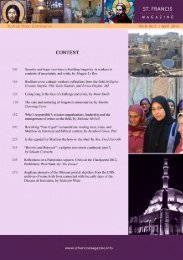Download the pdf - St.Francis Magazine
Download the pdf - St.Francis Magazine
Download the pdf - St.Francis Magazine
You also want an ePaper? Increase the reach of your titles
YUMPU automatically turns print PDFs into web optimized ePapers that Google loves.
<strong>St</strong> <strong>Francis</strong> <strong>Magazine</strong> Vol 9, No 4 | August 2013<br />
for religious or o<strong>the</strong>r reasons.” 3 The Islamic military expansion from 634 AD onwards, in which<br />
neighbouring nations were invaded, had an ideological basis. The Qur’an informed <strong>the</strong>m that Allah<br />
“has sent His Apostle with Guidance and <strong>the</strong> Religion of Truth to prevail over all religion” (Qur’an<br />
9:33; 48:28; 61:9). Jihad was <strong>the</strong> means devised to extend <strong>the</strong> political and military rule of Islam.<br />
This concept will be developed fur<strong>the</strong>r throughout this study. Moreover an incentive for <strong>the</strong>ir<br />
attacks was taking plunder from those <strong>the</strong>y invaded. This was very effective, for “Allah made <strong>the</strong><br />
Prophet wealthy through conquests” (alBukhari 3:495 4 ). The Qur’an records that Allah had made<br />
Muhammad (Qur’an 93:8) and his followers (Qur’an 9:74) rich– so do <strong>the</strong> hadith: “you were poor and<br />
Allah made you rich through me” (alBukhari 5:619). Economic gain was a clear purpose for <strong>the</strong><br />
Islamic expansion. “Arab warriors were … entitled to four-fifths of all <strong>the</strong> booty <strong>the</strong>y ga<strong>the</strong>red in<br />
<strong>the</strong> form of movable goods and captives.” 5 After Muhammad died, some of <strong>the</strong> Arabs claimed that<br />
<strong>the</strong>y would remain Muslims and still worship Allah alone but would no longer pay <strong>the</strong> compulsory<br />
zakat to <strong>the</strong> Muslim treasury. Abu Bakr said, “By Allah! I will fight those who differentiate between<br />
<strong>the</strong> prayer and <strong>the</strong> Zakat as Zakat is <strong>the</strong> compulsory right to be taken from <strong>the</strong> property (according<br />
to Allah's orders). By Allah! If <strong>the</strong>y refuse to pay me even a she-kid which <strong>the</strong>y used to pay at <strong>the</strong><br />
time of Allah's Apostle I would fight with <strong>the</strong>m for withholding it” (alBukhari 2:483, 536). Clearly,<br />
performance of <strong>the</strong> rituals and economic contribution to <strong>the</strong> cause were inseparable in early Islam,<br />
and military means could be used to enforce this connection.<br />
2. The impetus for warfare: self-defence, or self-proclaimed supremicism<br />
Israel’s fighting sometimes took place in <strong>the</strong> context of self-defence. Sihon king of Heshbon attacked<br />
<strong>the</strong> Israelites when <strong>the</strong>y asked for safe passage through his land (Deuteronomy 2:32). At o<strong>the</strong>r times<br />
<strong>the</strong> Israelites went into battle as a response to a previous attack.<br />
When <strong>the</strong> Canaanite king of Arad, who lived in <strong>the</strong> Negev, heard that Israel was coming along <strong>the</strong> road to<br />
Atharim, he attacked <strong>the</strong> Israelites and captured some of <strong>the</strong>m. Then Israel made this vow to <strong>the</strong> Lord: “If<br />
you will deliver <strong>the</strong>se people into our hands, we will totally destroy <strong>the</strong>ir cities.” The Lord listened to<br />
Israel's plea and gave <strong>the</strong> Canaanites over to <strong>the</strong>m. They completely destroyed <strong>the</strong>m and <strong>the</strong>ir towns.<br />
(Numbers 21:1-3).<br />
It is recorded that “<strong>the</strong> Amalekites came and attacked <strong>the</strong> Israelites at Rephidim” (Exodus 17:8).<br />
Joshua was attacked by <strong>the</strong> five kings of <strong>the</strong> Amorites– <strong>the</strong> kings of Jerusalem, Hebron, Jarmuth,<br />
Lachish and Eglon (Joshua10:5). Not all <strong>the</strong> battles of <strong>the</strong> Old Testament were fought in selfdefence,<br />
but some clearly were.<br />
Even though <strong>the</strong> early Muslims were not under foreign attack nor had <strong>the</strong>y been threatened by<br />
anyone, <strong>the</strong>y unilaterally presented o<strong>the</strong>r nations with an ultimatum. Byzantines (al-Bukhari 1:6;<br />
4:191), Persians (al-Bukhari 1:64; 4:190), and Bahrainis (al-Bukhari 1:64; 4:190) were all called to<br />
Islam and sometimes threatened by Muhammad. In a letter to Heraclius, <strong>the</strong> Byzantine king,<br />
Muhammad wrote: “If you accept Islam you will be safe; if you accept Islam God will give you a<br />
double reward; if you turn back <strong>the</strong> sin of <strong>the</strong> husbandmen will be upon you, i.e. <strong>the</strong> burden of it”. 6<br />
This was most likely a reference to Mat<strong>the</strong>w 21:33ff, where <strong>the</strong> “husbandmen” refused <strong>the</strong> request of<br />
<strong>the</strong> king, and mistreated his envoys, so <strong>the</strong> king sent his army to destroy <strong>the</strong>m. Muhammad was<br />
implying that he would do <strong>the</strong> same thing if his request was refused.<br />
Likewise he communicated with <strong>the</strong> Omani leaders. According to Islamic tradition, Prophet<br />
Muhammad (PBUH) sent a letter to <strong>the</strong> two princes Abd and Jeifer in <strong>the</strong> year 630 A.D. He called<br />
upon <strong>the</strong>m to accept Islam. The wording of <strong>the</strong> letter was as follows:<br />
In <strong>the</strong> name of God, <strong>the</strong> most gracious, <strong>the</strong> most Merciful. From Muhammad <strong>the</strong> Messenger of God to<br />
Jeifer and Abd, <strong>the</strong> sons of Al-Julandy… I call upon you to embrace Islam– accept and you will be saved, for<br />
I am <strong>the</strong> Messenger of God to all humanity. (I have come) to warn <strong>the</strong> living that affliction will befall<br />
unbelievers. If you accept Islam, as I hope you will, all will be well, but if you refuse to accept it, your<br />
3 Fred Donner The Early Islamic Conquests (Princeton Univ Press, 1981) p. 251.<br />
4 This will be denotation for references from Sahih al-Bukhari’s Hadith collection e.g. alBukhari 6:14 refers to <strong>the</strong> 6 th volume<br />
of alBukhari (it has 9 volumes) and <strong>the</strong> 14 th account in that volume.<br />
5 John B. Noss Man’s Religions (New York: The Macmillan Co., 1956) p. 711.<br />
6 Ibn Ishaq Sirat Rasul Allah, p. 654. Guillaume believes that “husbandmen” was a reference to Mat<strong>the</strong>w 21:33ff.<br />
<strong>St</strong> <strong>Francis</strong> <strong>Magazine</strong> is published by Arab Vision and Interserve 44







![Reflections on Surah Fatiha and the Lord's Prayer[1] - St.Francis ...](https://img.yumpu.com/49377951/1/184x260/reflections-on-surah-fatiha-and-the-lords-prayer1-stfrancis-.jpg?quality=85)









